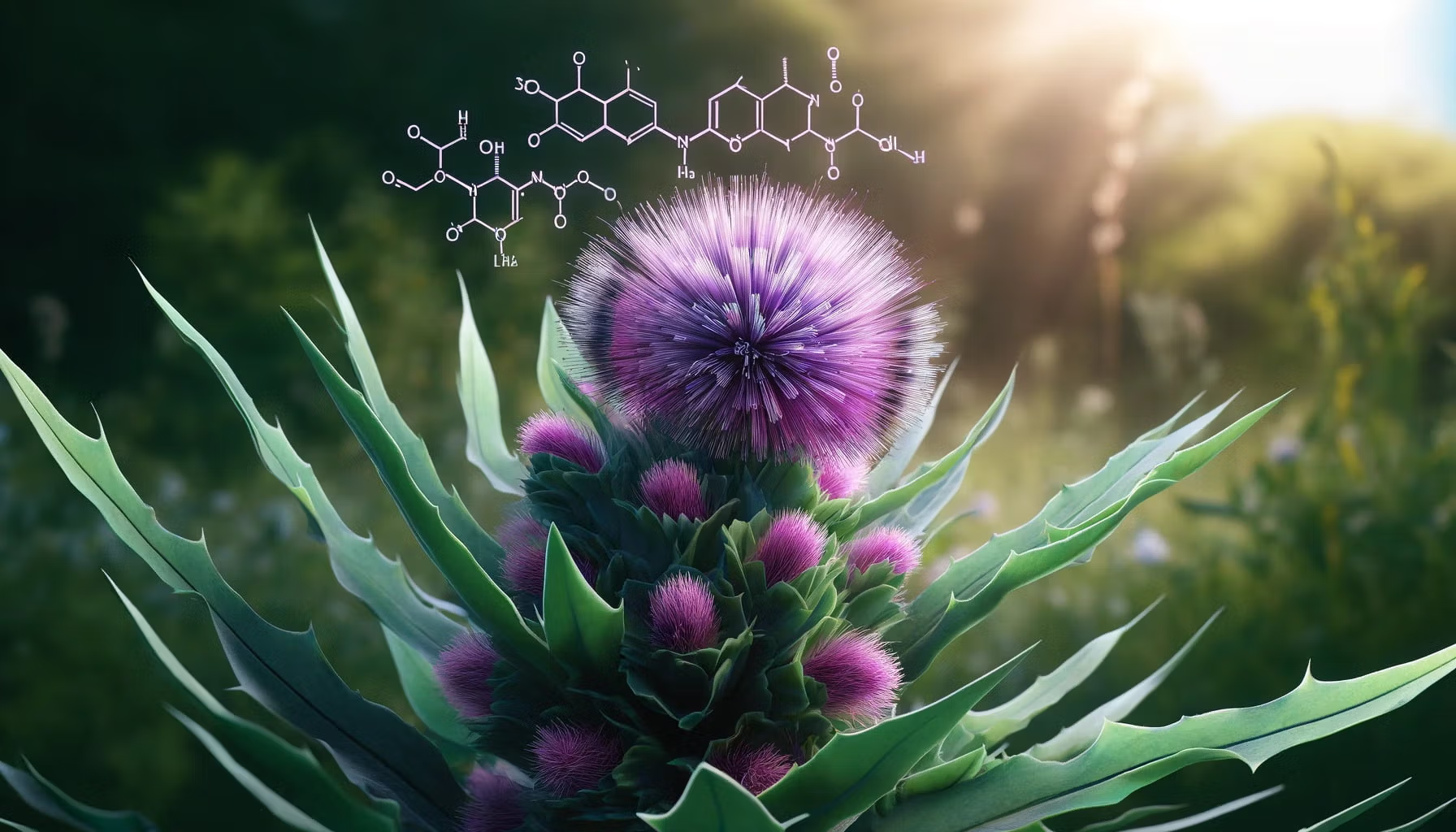
Milk thistle (Silybum marianum), a plant with purple flowers and white-veined leaves, has been used medicinally for centuries.
Its active compounds, collectively known as silymarin, have antioxidant and anti-inflammatory properties.
Recent research suggests milk thistle may offer cognitive benefits by reducing oxidative stress and inflammation in the brain, potentially improving memory and focus.
Table of Contents
What Is Milk Thistle?

Milk thistle (Silybum marianum) is a tall, prickly plant with distinctive purple flowers and white-veined leaves. It’s also known as Marian thistle, silibinin, Mary thistle, or orsilicristin.
It is part of the Asteraceae family, which also includes daisies and thistles.
The plant is named for the milky white fluid that comes from the leaves when they are crushed.
Milk thistle is native to southern Europe, southern Russia, Asia Minor, and northern Africa, but now grows wild throughout the world.
What Are the Active Compounds in Milk Thistle?
The active ingredients in milk thistle are a group of plant compounds collectively known as silymarin.
Silymarin is a complex of at least 7 flavonolignans and 1 flavonoid that are extracted from the seeds of the milk thistle plant.
The main active component of silymarin is silybin (silibinin), which makes up 50-70% of silymarin.
Other components include isosilybin, silychristin, silydianin, and taxifolin. These compounds have antioxidant, antiviral, and anti-inflammatory properties.
What Were the Traditional Uses of Milk Thistle?
Milk thistle has been used as a medicinal herb for over 2,000 years. According to the Roman naturalist Pliny the Elder, it was excellent for “carrying off bile.”
In the Middle Ages, milk thistle was revered as an antidote for liver toxins. By the 16th century, English herbalist John Gerard noted that milk thistle was “the best remedy that grows against all melancholy diseases.”
Traditionally, the leaves and flowers were used to treat liver and gallbladder disorders, promote breast milk production, prevent and treat cancer, and even protect the liver from snake bites, alcohol, and other environmental poisons.

What Are the Potential Cognitive and Brain Health Benefits of Milk Thistle?
While milk thistle is most well known for its liver-protective effects, emerging research suggests it may also have neuroprotective and cognitive benefits:
- Antioxidant effects: Silymarin acts as a powerful antioxidant in the brain, scavenging free radicals and reducing oxidative stress, which can damage neurons.
- Anti-inflammatory properties: Silymarin reduces inflammation in the brain by inhibiting pro-inflammatory cytokines. Neuroinflammation is implicated in neurodegenerative diseases like Alzheimer’s and Parkinson’s.
- Neurotransmitter modulation: Silymarin may increase levels of acetylcholine and serotonin. Acetylcholine is critical for learning and memory, while serotonin influences mood, memory, and learning. In a mouse study, silymarin increased acetylcholine and serotonin levels in the cortex and hippocampus.
- Aβ plaque inhibition: The accumulation of beta-amyloid (Aβ) plaques in the brain is a hallmark of Alzheimer’s disease.(1)
- Neurogenesis: Silymarin may stimulate the growth of new brain cells (neurogenesis), especially in the hippocampus, the brain’s memory center.
Note: While these preliminary findings are promising, more human research is needed to confirm milk thistle’s neuroprotective and nootropic potential.
Most studies so far have been done in animal models.
How Does Milk Thistle Improve Learning and Memory?
Milk thistle enhances learning and memory by increasing levels of acetylcholine, a neurotransmitter critical for encoding new memories.
A clinical study found that silymarin, the active compound in milk thistle, increased acetylcholine levels in the brains of rats, leading to improved performance on memory tests.(2)
Silymarin also protects neurons from oxidative damage, which can impair memory formation.
By shielding brain cells, milk thistle preserves and enhances memory and learning abilities.
How Does Milk Thistle Increase Focus?
Milk thistle sharpens focus and concentration by optimizing dopamine function in the brain.
Dopamine is a neurotransmitter involved in attention, motivation and mental sharpness.
Scientific research demonstrates that silymarin modulates dopamine release and prevents its depletion, leading to enhanced focus.(3)
Silymarin also inhibits the enzyme acetylcholinesterase, which breaks down acetylcholine. Higher acetylcholine levels are associated with improved attention span and focus.
Hows Does Milk Thistle Support Brain Health?
Milk thistle extract is a potent neuroprotective agent that supports overall brain health and function. It’s a rich source of antioxidants and anti-inflammatory compounds that shield neurons from damage.
A clinical analysis found that silymarin protects brain cells against neurotoxins and reduces markers of inflammation in the brain by 30-50%.(4)
By defending neurons from harm, milk thistle helps maintain optimal brain health and cognitive performance.
How Does Milk Thistle Prevent Cognitive Decline?
Milk thistle may help prevent age-related cognitive decline and neurodegenerative diseases by reducing oxidative stress and inflammation in the brain.
According to a clinical review, silymarin decreased markers of oxidative damage and neuroinflammation that contribute to cognitive impairment.(5)
Animal studies also show that milk thistle improves memory deficits associated with aging and Alzheimer’s disease.
By protecting the brain from progressive damage, milk thistle may slow cognitive decline.
How Is Milk Thistle Typically Used as a Supplement?
Milk thistle supplements are most commonly found in capsules or tablets containing the dried herb or seed extract.
Milk thistle extract is also available as a liquid tincture and as a tea.
For maximum potency, look for an extract that is standardized to contain 70-80% silymarin.
Milk thistle supplements are often marketed as liver support or detox formulas.
What Are the Nootropic Uses of Milk Thistle?
Milk thistle is primarily recognized for its liver-protective properties. However, it also has potential nootropic uses, which refer to its benefits in enhancing cognitive function.
Here are some key nootropic uses of milk thistle:
- Neuroprotection: Silymarin has antioxidant properties that help protect brain cells from oxidative stress and inflammation, which can contribute to cognitive decline and neurodegenerative diseases.
- Memory Enhancement: Some studies suggest that silymarin may improve memory and learning. It is believed to enhance brain function by promoting the health of neurons and synaptic plasticity.
- Reducing Neuroinflammation: Chronic inflammation in the brain is linked to various cognitive disorders, including Alzheimer’s disease. Milk thistle’s anti-inflammatory properties may help reduce this inflammation, potentially protecting against cognitive decline.
- Detoxification: By supporting liver function, milk thistle aids in the detoxification process. A healthy liver can better remove toxins from the body, including those that may affect brain health.
- Improving Mood and Mental Clarity: Some anecdotal evidence suggests that milk thistle can help improve mood and mental clarity, possibly by reducing brain inflammation and oxidative stress.
- Support in Neurodegenerative Diseases: Research is ongoing, but there is some evidence that milk thistle might offer benefits for conditions like Parkinson’s and Alzheimer’s diseases due to its neuroprotective effects.
What Is the Typical Dosage of Milk Thistle Supplements?
The typical recommended dosage for milk thistle is based on its silymarin content:
| Form | Dosage | Frequency |
|---|---|---|
| Capsules | 200-400 mg per day of extract standardized to 70-80% silymarin | divided into 2-3 doses |
| Tincture | 2-3 mL of an alcohol-based tincture standardized to contain 70-80% silymarin | 3 times per day |
| Tea | Pour 1 cup of boiling water over 1 tsp of dried seeds and steep for 10-20 minutes | 2-3 cups per day |
Higher doses up to 800 mg per day have been used in some studies, especially for liver conditions.
However, it’s best to start with a lower dose and increase gradually to assess your tolerance. Always follow the dosing instructions on the product label.
Can Milk Thistle Be Used In A Nootropic Stack?
Yes, milk thistle can be incorporated into a nootropic stack for its neuroprotective and cognitive-enhancing properties. It may pair well with other nootropics that support brain health and cognition, such as:
- Bacopa monnieri: A herb that enhances memory, learning, and attention. Like milk thistle, it has antioxidant and anti-inflammatory effects in the brain.
- Lion’s Mane Mushroom: A medicinal mushroom that stimulates nerve growth factor (NGF) and brain-derived neurotrophic factor (BDNF), promoting neurogenesis and neuroprotection.
- Phosphatidylserine: A phospholipid that is critical for healthy brain cell membranes. It supports memory, focus, and cognitive processing.
- Acetyl-L-Carnitine: An amino acid that enhances energy production in the brain and may improve memory and slow age-related cognitive decline.
Monitor your individual response and adjust the dosage as needed. Be aware of potential drug interactions.

Are There Any Side Effects or Precautions with Milk Thistle?
Milk thistle is generally safe and well tolerated when taken in recommended doses.
Occasionally, it can cause:
- Mild digestive side effects
- Upset stomach
- Diarrhea
- Nausea
- Bloating
Other uncommon side effects may include headache, itchiness, and joint pain.
Are There Any Drug Interactions with Milk Thistle?
Yes, milk thistle can potentially interact with several medications, either decreasing or increasing their effects:
- Antipsychotics: Milk thistle may lessen the effectiveness of antipsychotic drugs like chlorpromazine.
- Diabetes medications: Milk thistle may cause additive blood sugar-lowering effects.
- Hepatotoxic drugs: Milk thistle may protect against liver damage from drugs like acetaminophen, methotrexate, and others.
- HIV drugs: Milk thistle may reduce the blood levels of indinavir and other antiretroviral drugs.
- Immunosuppressants: Milk thistle may increase the risk of kidney damage from drugs like cyclosporine.
- Statins: Milk thistle may increase the effects of some cholesterol-lowering statin drugs.
- Warfarin: Milk thistle may increase the blood-thinning effects of warfarin.
Always check with your doctor or pharmacist before combining milk thistle with any medications to avoid potentially dangerous interactions.
Who Should Avoid Milk Thistle?
Certain people should avoid milk thistle or use caution:
- Pregnant and breastfeeding women
- People allergic to plants in the Asteraceae family (ragweed, chrysanthemums, marigolds, daisies)
- People with diabetes or hypoglycemia
- People with a history of hormone-sensitive cancers (such as breast, uterine, and prostate cancer)
- People taking medications that may interact with milk thistle
How Do You Choose The Right Milk Thistle Supplements?
When selecting a milk thistle supplement, look for products that meet the following criteria:
- Standardized to contain 70-80% silymarin
- Made by a reputable company that follows Good Manufacturing Practices (GMP)
- Third-party tested for purity and potency
- Free of cheap fillers, binders, and artificial ingredients
- Clearly labeled with the amount of active ingredients per serving
Avoid products that make grandiose health claims or are not transparent about their ingredient sourcing and quality control measures.
- Guo, Hong et al. “Silymarin’s Inhibition and Treatment Effects for Alzheimer’s Disease.” Molecules (Basel, Switzerland) vol. 24,9 1748. 6 May. 2019, doi:10.3390/molecules24091748↩
- El-Marasy, Salma A et al. “Ameliorative Effect of Silymarin on Scopolamine-induced Dementia in Rats.” Open access Macedonian journal of medical sciences vol. 6,7 1215-1224. 17 Jul. 2018, doi:10.3889/oamjms.2018.257↩
- Ullah, Hammad, and Haroon Khan. “Anti-Parkinson Potential of Silymarin: Mechanistic Insight and Therapeutic Standing.” Frontiers in pharmacology vol. 9 422. 27 Apr. 2018, doi:10.3389/fphar.2018.00422↩
- Borah, Anupom et al. “Neuroprotective potential of silymarin against CNS disorders: insight into the pathways and molecular mechanisms of action.” CNS neuroscience & therapeutics vol. 19,11 (2013): 847-53. doi:10.1111/cns.12175↩
- Chandolia, Priyanka et al. “Neuroprotective effect of silymarin against 3-Nitropropionic acid-induced neurotoxicity in rats.” Current research in pharmacology and drug discovery vol. 3 100130. 20 Sep. 2022, doi:10.1016/j.crphar.2022.100130↩

